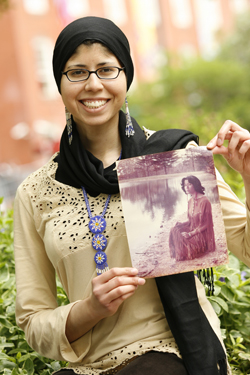A focus on her tribal heritage takes Philly native to the west coast
Bachelor of arts: Geography and urban studies
 Photo by Ryan S. Brandenberg/Temple University
Fatima Abbas holds a photo of her mother, a member of the Haliwa Saponi tribe of North Carolina. The personal connection helped fuel Abbas’ research into the legal and political definitions of dependent Native American nations and Native American law.
|
For her undergraduate research project, Fatima Abbas chose a subject that held more than academic significance for her. She looked at how the lack of federal recognition of Native American tribes affected the Haliwa Saponi of North Carolina, a project that grew out of her dual interests in public health and social policy. But beyond that was its personal resonance — her mother is a member of the North Carolina tribe. Although Abbas is a Philadelphia native whose father is of Pakistani descent and paternal grandmother was the first female lawyer in Pakistan, the College of Liberal Arts graduate lived briefly in North Carolina, where she developed her interest in her tribal heritage. “My mother raised me with a strong Native American identity. When she was young, she was very involved in her tribal community, and participated in powwow dances,” Abbas said. Armed with a 3.9 grade-point average and an honorable mention in the Native American Health category in the prestigious Morris K. Udall scholarship competition in 2007, Abbas originally set her sights on pursuing a master’s in public health and was accepted into the London School of Economics. However, her family’s needs forced her to postpone her graduation and remain in Philadelphia to provide care for her disabled father and her recently injured mother. She won a Diamond Scholarship for the summer of 2007 to continue her research |
|
into the federal recognition of Native American tribes. In January, Abbas presented her findings at a statewide research symposium on Capitol Hill in Harrisburg. Through her research into the legal and political definitions of dependent nations and Native American law, she learned that access to the legal system during the Indian Civil Rights era enabled tribes to bypass control by the Bureau of Indian Affairs and independently seek fishing rights and land reclamation that held significant economic and cultural importance for them. “I began to see the legal system as a way to empower impoverished communities,” Abbas explained. “The legal system has enabled recognized tribes to access and enforce their rights and the benefits of their government sanctioned internal sovereignty.” As a result of her research, she has decided to pursue a joint degree in law and public health. Following her graduation in May, Abbas will be begin studies toward a J.D./M.P.H. at the University of California–Berkeley’s Boalt School of Law, with a full-tuition scholarship and grant for the second and third years of law school. |
|